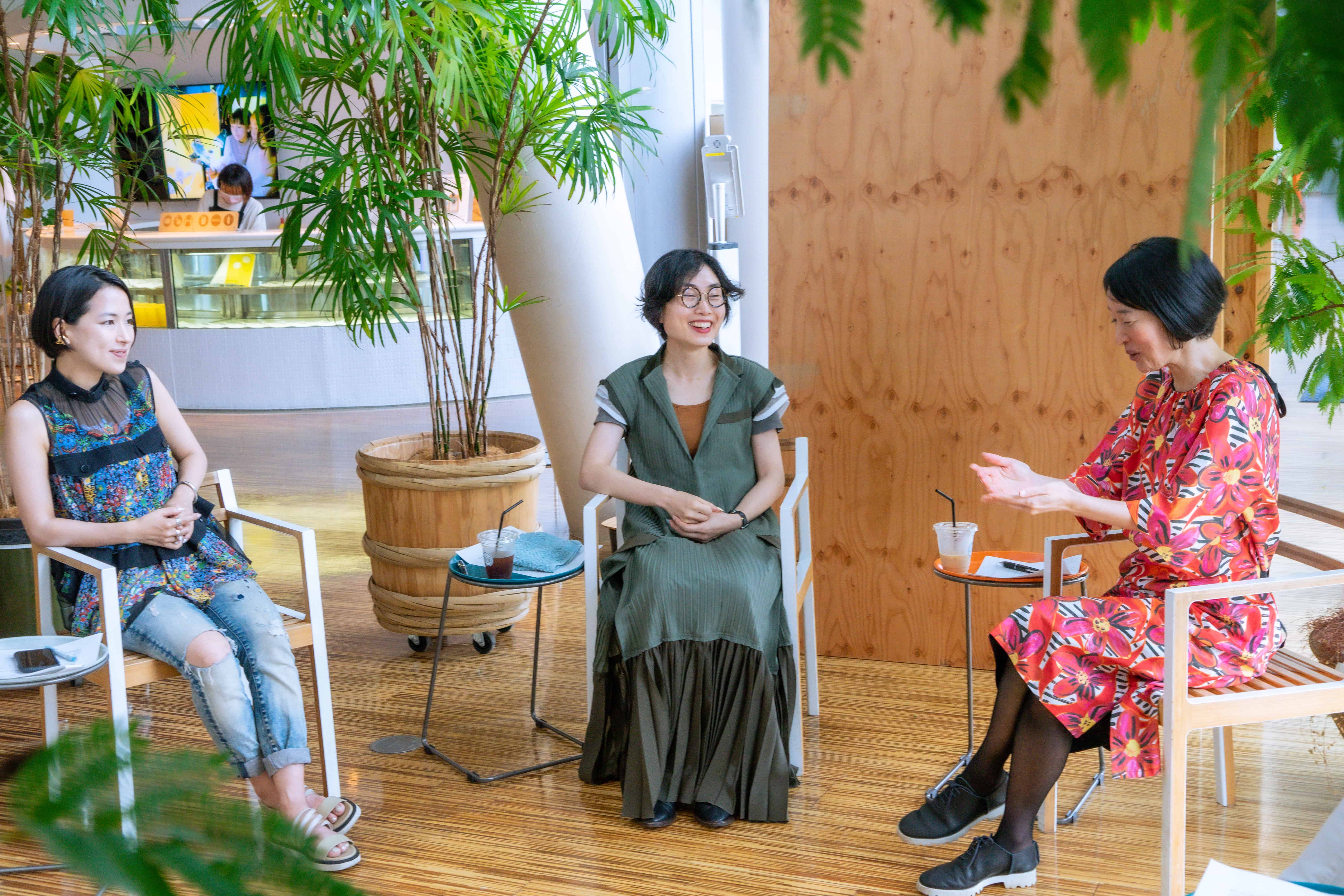The theme of this year’s YouFab Awards, which are celebrating the 10th anniversary this year, is “Democratic experiment(s)”. The theme seems abstract and complex at first glance, but when boiled down, it is actually a very simple and clear-cut theme. Prior to the kick-off of this year’s awards, jury head Asa Ito, jury member Arina Tsukada, and YouFab owner Chiaki Hayashi sat down and discussed how to unravel and explore this theme.
Writer / Rikako Maruyama, Interviewer / Misaki Toda
Photography by Masanori Kawaharada, Editing by Sho Hosotani
YouFab and How It Was Born
ー Please tell us the brief background and overview of the YouFab Awards, which will be welcoming its 10th anniversary this year.
Hayashi:You Fab was established at the same time as FabCafe, and it is entering its 10th year. Back then, 3D printers and laser cutters were groundbreaking technologies, and people didn’t really know what exactly they were. That’s why YouFab started — to spread awareness of the technology and to enlighten people on what they can do with it.
3D printers have changed dramatically in the past decade, having an expanded field and range. The technology is becoming further advanced. In 2015, the Grand Prix was awarded to a dress that was made by a 3D printer.
[ Kinematics Dress:YouFab Global Creative Awards 2015 Grand Prize ]
Nowadays, we even have digital sewing machines that can sew clothes based on the blueprint data, and technologies that can cut down trees based on the 3D data of forests.
[ Tree shapes, branches and leaves become clearer in 3D. The latest laser measurement technology captures the shape of the forest. And we will make use of it.]
I really feel that the YouFab realm is expanding more than ever. Regardless, we need to keep in mind that tomorrow can only be born through “what we create”. This leads to this year’s theme “Democratic experiment(s)”, which is also what YouFab has been doing for the past decade. The bottom line is that we wanted to ask the applicants this year, “what can we create in our 10th year?”
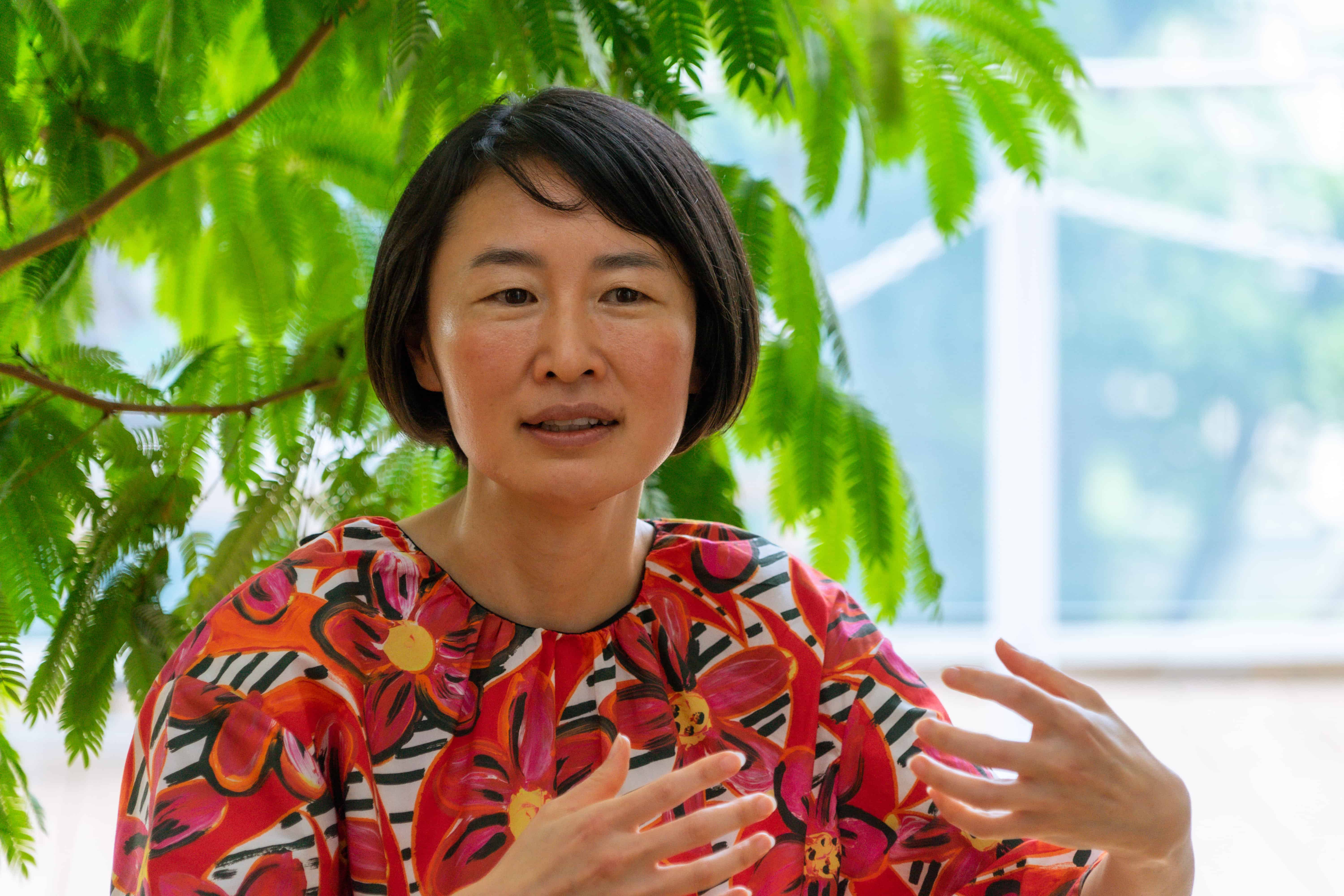
Chiaki Hayashi:Owner of YouFab Global Creative Awards.Co-founded Loftwork Inc. in 2000 and currently serves as its representative director. Loftwork is a new style of creative agency that boasts a network of over 25,000 creators. Each year Loftwork rolls out over 200 projects including web, community, and spatial design initiatives. Loftwork also operates the digital fabrication cafe, FabCafe. Hayashi pioneered the adoption of Project Management Body of Knowledge (PMBOK) guidelines in the creative industries in Japan, and has penned the book Web Project Management Standards. Hayashi is Japan Liaison to the Director of MIT Media Lab, a member of the Good Design Awards Screening Committee, and a member of the Manufacturing Industry Subcommittee of METI's Industrial Structure Council Committee.
Democratic experiment(s) -- A Democratic Creation and an Experiment of Democracy
ー Well then, while we explore the possibilities of “what we create” as YouFab, I’d like to go deeper into this year’s theme, “Democratic experiment(s)”. As the head of the jury, why did you choose this theme?
Ito:We wanted to imply two things in the term “Democratic experiment(s)”. The first one is literally “democratic experiment”, meaning that we will be carrying out the experiment of creation by taking democratic procedures and attitudes. The second one is “experiment of democracy” — in other words, to create and explore democracy through creation. This theme, or wording, was inspired by architect Yoshiharu Tsukamoto.
There is this wicked building on the Tokyo Institute of Technology campus called the Environmental Energy Innovation Building, which Tsukamoto built in collaboration with several laboratories. It is built along the curve of railroad tracks, and the area facing the tracks is covered with 4000 solar panels. It was built right after the Great East Japan Earthquake, so it was designed to generate almost all the electricity it uses.
This building is unquestionably “smart”, but Mr. Tsukamoto had apparently had doubts at the same time. The building was so smart that it seemed to be sending this message that the people living there didn’t need to change their lives.
We live in a time full of global problems such as global warming and wealth imbalance, and we need to seek a different way of living. Living in a building with solar panels may seem like an environmentally friendly option. In fact, CO2 emissions were reduced by more than 60%. However, if the lifestyle of the people inside the building does not change, it will only preserve the values of mass production and mass consumption, and merely put off finding a solution in the long run. I feel a little scared when I think about that.
So from there, Mr. Tsukamoto started this new activity based on the concept of “resourceful human”. You’ve probably heard “human resource”, which refers to the people who are “resourceful” — or useful for existing organizations such as companies. But what Mr. Tsukamoto said was that we need to create people who can extract resources from their surrounding environment in order to survive. So came his concept, “resourceful human”.
He established this community in the mountains of Kamogawa in Chiba Prefecture, and is now engaged in various activities such as farming and renovating old houses. In other words, his laboratory is raising people who can acquire the wisdom to live together with the environment. These people question or tell themselves things like “I wonder if I can eat this weed,” or “I need to build a fire, it’s cold today.”
Mr. Tsukamoto told me this very intriguing observation he has about architecture — that architecture is ultimately an array of meetings with countless stakeholders, including the client, the animals and plants living in the environment, bacteria, and maybe even the deceased. It is about having a dialogue with all of these stakeholders, whether they be human beings or not. In that sense, he said, each architecture is an experiment of democracy. I was truly moved by these words, and they have stayed with me ever since. That was the inspiration I had when I decided on the theme for this project.
Until now, creation was completed in the atelier by reproducing what you wanted to make with the materials you wanted to use. I think this has backed up and enhanced the convenience given from mass production and mass consumption, but it has also caused various problems such as environmental issues and wealth inequality.
But the act of creation actually involves an infinite number of stakeholders, who pull each other in and influence each other without even being aware of it. We can no longer turn away from this very fact that just by creating one thing, everything becomes connected. We need to be aware and understand that the act of creation is connected to various things. That is what it means to “create” in a democratic way, and I think this will be a new experiment in democracy.
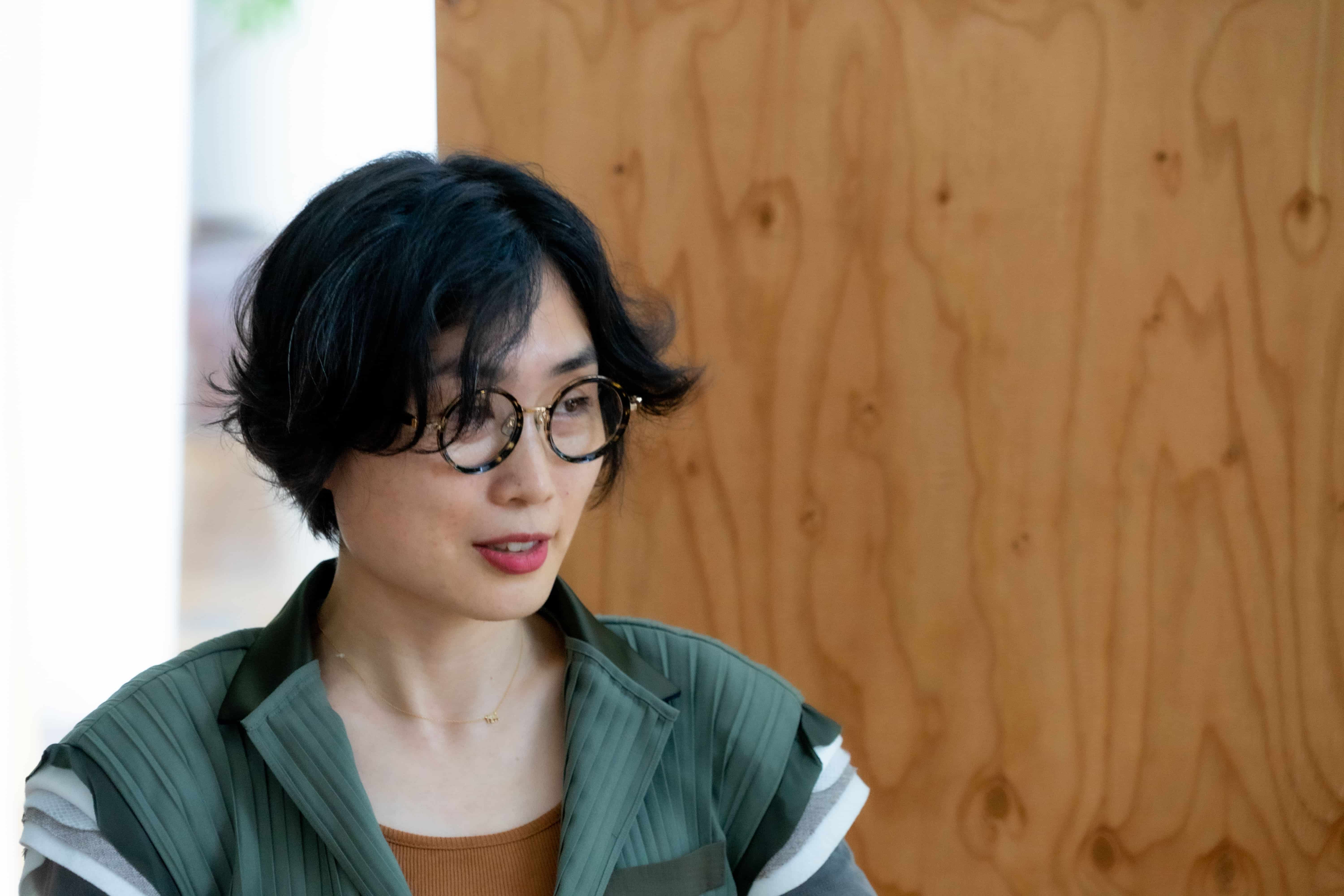
Asa Ito:Chief Judge of the YouFab Global Creative Awards 2021.Jury.Director, Future of Humanity Research Center, Institute of Innovative Research, Tokyo Institute of Technology Asa Ito is Director of the Future of Humanity Research Center at the Tokyo Institute of Technology’s Institute of Innovative Research, and Visiting Scholar at MIT (2019), specializing in aesthetics and contemporary art. After initially intending to become a biologist, she turned her academic focus to the arts while in her third year at university. She obtained her PhD in Literature in 2010, having studied aesthetics, fine arts, and culture at the University of Tokyo Graduate School of Humanities and Sociology. As author, Dr. Ito’s major works include Me no mienai hito wa sekai wo do miteiru no ka (How Do People Without Sight See the World?, Kobunsha), Domoru karada (The Stuttering Body, Igaku-Shoin), Kioku suru karada (The Remembering Body, Shunjusha), and Te no Rinri(Ethics of hands, Kodan-sha). Her work was recognized with the 42nd Suntory Prize for Social Sciences and Humanities in 2020.
Exploring through “Democratic”
ー This is rather a fundamental question. Could you please discuss how you define and perceive “democratic” and “experiment(s)”?
Tsukada:When I heard the term “Democratic experiment(s)”, it reminded me of an initiative in Barcelona called “El Campo de Cebada“, which was awarded in the Digital Community category of the 2013 Ars Electronica.
After the collapse of Lehman Brothers, there was a period of time when vacant houses in Barcelona increased due to the economic crisis, and the place that was supposed to be a huge commercial center became a huge empty lot. But then at some point, people started putting benches there, drinking coffee, installing slides for children, holding outdoor stages on weekends… and it became a common space. The entire process won the grand prize (Golden Nica) at the Ars.
When I came across this, I thought that new things were able to emerge thanks to the blank empty space that had existed in the city. Had there been a purpose from the beginning, people would have behaved in accordance with it.
So for this “Democractic experiment(s)”, instead of having it be a project with a purpose, I think it will be interesting to discover how new things can be born from a blank empty space. I would like to see how people’s imagination arises.
Furthermore, while people may associate a group of people coming together to share their wisdom when they hear the word “democratic,” I also believe it is an attempt to see how we can coexist and live together with people who have completely different opinions.
Friction is inevitable between people with completely different ways of thinking and those who do not share a common language, but there are things that can be seen beyond that friction.
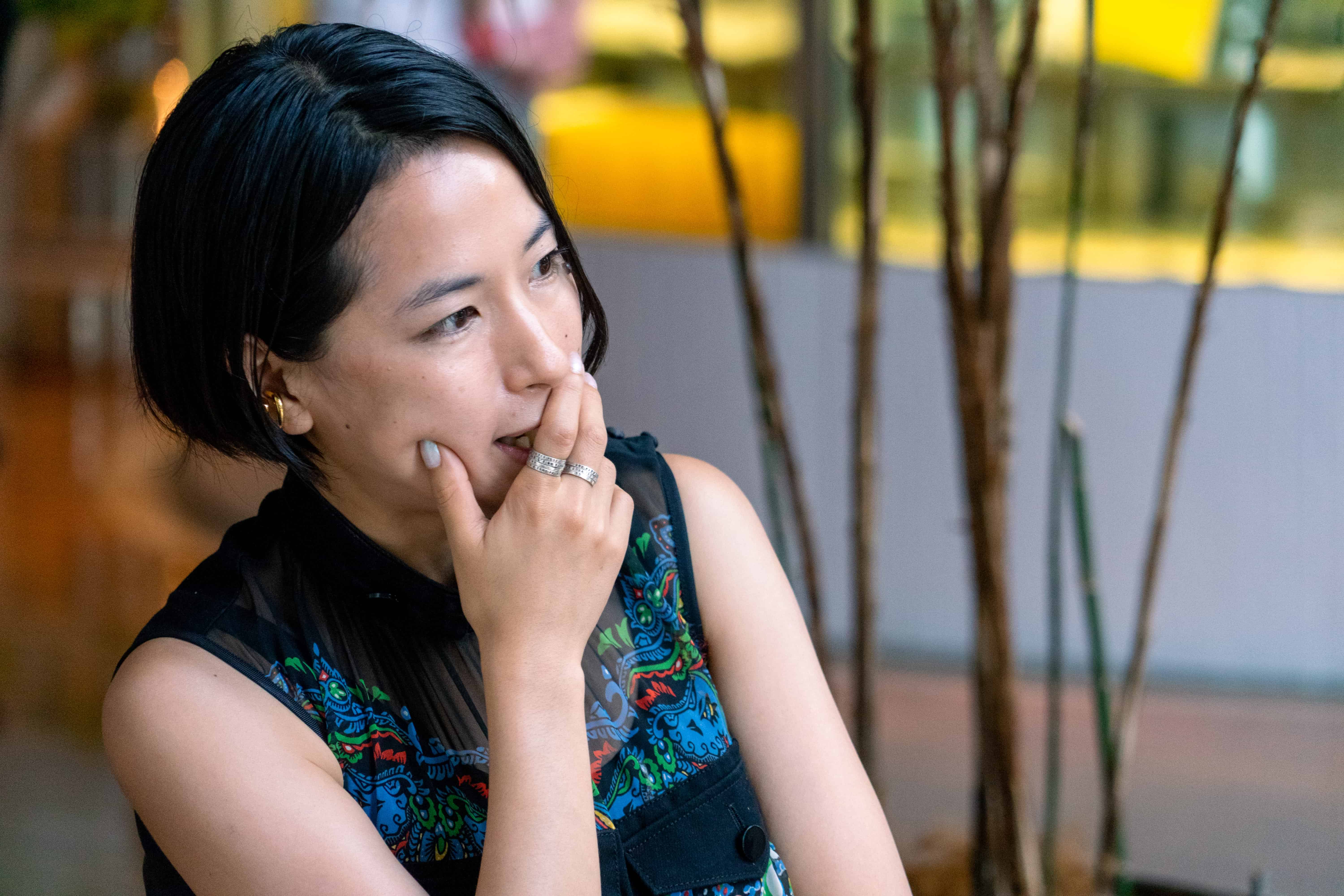
Arina Tsukada:Judge of the YouFab Global Creative Awards 2021.Arina Tsukada is an explorer in new fields of Art & Science. Founder of The Whole Universe Association since 2018. With a diverse professional background, she is known for her participation as the director of the Sound Art project “See by your ears”, led by a sound artist Evala, as well as for being the editor in chief of the Art & Science online magazine “Bound Baw” since 2016. She continues to explore new worlds of possibilities through an interdisciplinary approach. Using art and science, and her multidisciplinary background, she has organized multiple conferences, exhibitions, media-productions, and the other spectacular events. She is also the author of the books “Art Science is (2018)”, co-author “Information Umwelt - Guidebook for playing between AI and human body(2019).”
Ito:I totally agree. I used the word “integrity” in the statement I wrote, and what I really intended there is to respond to those frictions.
Being “democratic” means that there is no universality. It is something that blossoms by searching for the best solution based on the conditions of the people and materials gathered in each place, and I think sincere democracy is about pursuing this individuality.
Hayashi:To put it in more simple words, “democratic” is about “us.” It is the “we” that includes the “I”.
Tsukada:I agree. If I can add to that, I think the post-democratic concept will be how to expand the scope of what we can imagine from “we”. Just as there are things that fall out when we say “we Japanese”, there are creatures that are not mankind that fall out when we say “we humans”. I think it’s important to expand the range of what we can imagine when we say “we” and to increase the number of options.
Ito:As much as I agree, when you particularly think about the act of “creating,” I also believe that there are things that emerge from not only actively doing something, but from being involved in things without even realizing it.
I have many opportunities to work with people with disabilities in my research, and I realized that actively trying to help them usually doesn’t work. Let’s say there is a blind person. Then you’ll wonder, “how can I have fun with this person?” That is when disability brings out creativity. It’s as if your body is automatically responding and moving because there is a person in need, right before your eyes. That’s why I believe there is a similar approach when you create things — you can think about what you can do when you are entangled in an unexpected situation.
Creativity for the Imagination
ー The outbreak of the COVID-19 crisis triggered and forced change of various things. What changes do you feel have taken place in terms of the “democratic” aspect that you mentioned? What kind of issues do you think exist?
Tsukada:I know this is very personal, but I recently lived in this old house in Wakayama for a month. And this experience of stepping on earth instead of concrete every day was mind-blowing.
You often hear people say that the countryside is quiet, but it’s actually very noisy. You hear all these insects and birds, and you probably just feel that there are more deer around than people. After being in such an environment for a while, I started to become aware of the “cycle” — what I eat and what I excrete, which I usually am not aware of. I couldn’t go abroad because of the pandemic, and because I was closed off, I became even more conscious of the zone around me and in Japan.
In the same way I was unaware of the exclusive nature of the word “we”, I realized that I usually have many of my sensors closed. I was able to notice this when I was surrounded by abundant sound and smell in nature. By simply opening up my sensors that are normally closed, I can probably see many things that I usually don’t. I thought to myself that I don’t want to dull those sensors.
Ito:You see, that’s where things get kind of complicated. I think imagination, which is one of YouFab’s selection criteria, is very limited. You can imagine things within a radius of up to 500 meters, but you can’t when it’s on a global scale.
Even elementary school students are learning about SDGs nowadays, but there are no fun things awaiting in the future for them because only issues await. They are constantly practicing thinking about the earth, which is something that is too big for us to understand, and I don’t think people’s imagination can keep up with something like that.
Hayashi:I know exactly what you mean. I first said “Democratic experiment(s)” in a sense that “we create”, but as Ms. Tsukada said, I realized how closed our sensors usually are. But those sensors don’t open up by themselves. They can only be liberated by the outside world. That’s what Ms. Ito was talking about when she mentioned doing something actively or being involved in things without even realizing it.
Tsukada:I have my own thoughts about the scope of imagination, or the imagination within a 500 meter radius. People say having a “wide” imagination, but would it mean that you are creative and imaginative if you were able to think of the planet and or outer space? Imagination can also be about how deep you can dig within a radius of five meters, right? Same goes for the word “democratic” — it may sound like a very broad term, but how deep can you explore when your sensors are open? I would like people to experiment and see how much “unconscious” they can be conscious of.
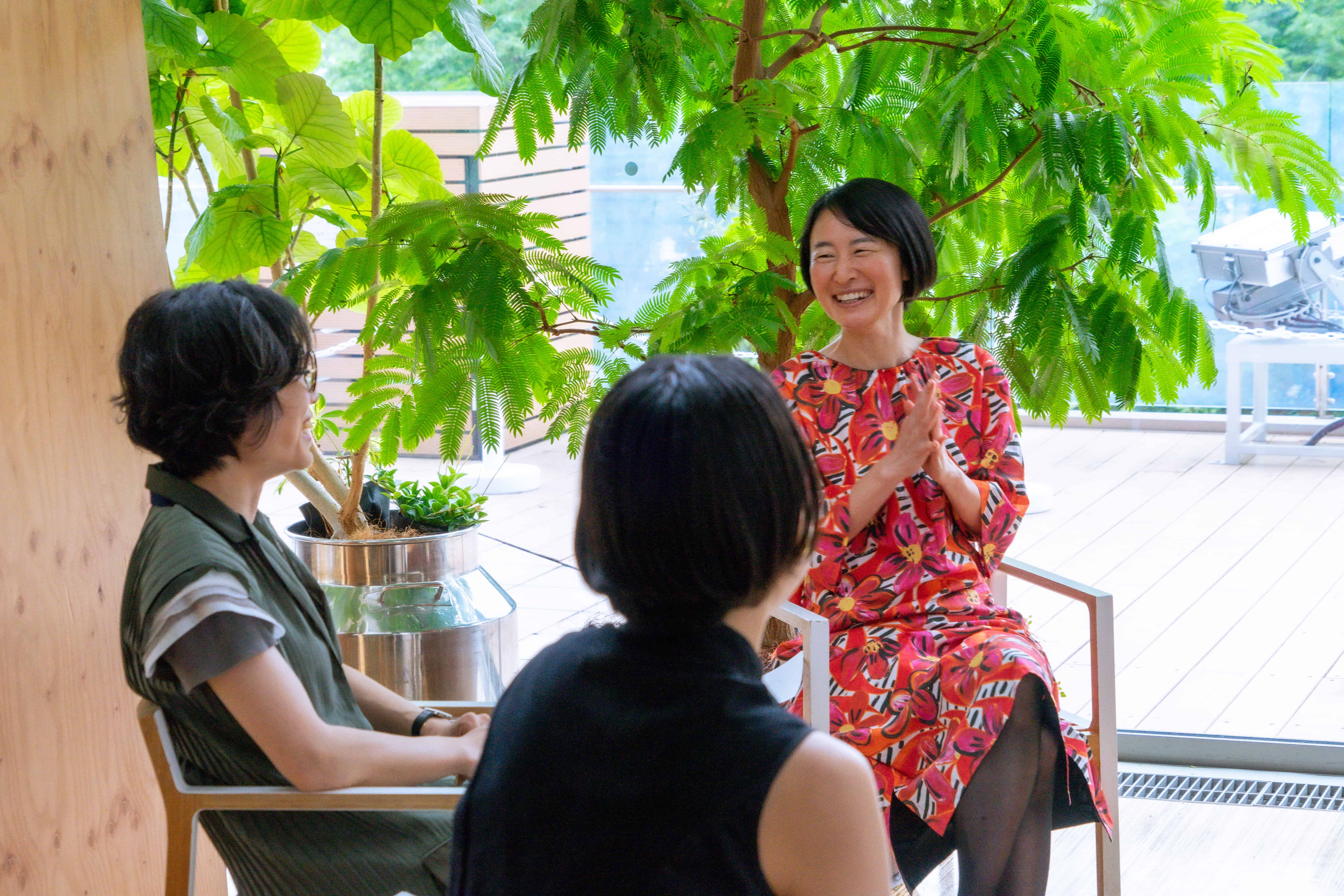
An Experimental Award to Return to the Basics
ー What do you expect beyond the experiment(s) that will be carried out?
Hayashi:I would like to see experiments we have never imagined. I would especially like to encourage people who think they have no connection to international art shows and awards to apply this time, as if they got accidentally “involved” in this.
Tsukada:I would like people to see it as an award for various experiments that transcend the boundaries of art.
Ito:“Democratic” itself is an abstract word, isn’t it? But when you get right down to it, I think the idea and the theme of this exhibition is very simple: we’re returning to the basics — to the root of the act of creation. The question is: what does it mean to “create” in the first place? Creating itself involves encounters with various things, and I believe some of these will lead to collisions. But if you can enjoy the whole process, including the twists and turns, I think there’s a lot of potential to it. I hope all the applicants will expand those possibilities.
